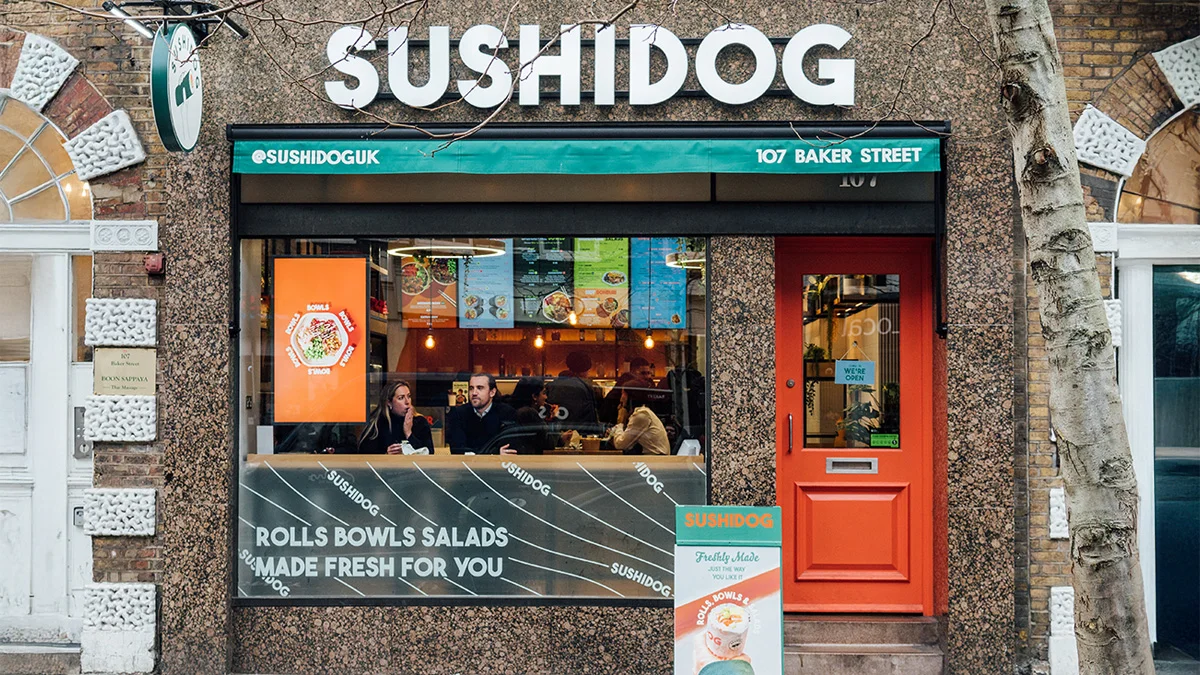Forget the traditional favourites of a cheese and pickle or a ham and mustard sandwich – sushi is one of the fastest-growing lunchtime options in the UK. Yet it is a crowded market, with brands such as Yo! Sushi and Wasabi vying with the supermarkets for spending.
With that in mind, it might seem like there isn’t much space for a new venture. But SushiDog would disagree.
Greg Ilsen and Nick Goldstein founded SushiDog in 2018. The two had been friends since school and even went to university together, so it seemed a natural next step to see if they could come up with a business idea that meant they could work together as well.
They brainstormed several concepts, but the one that stood out was customisable sushi rolls, made fresh daily. This trend was gaining popularity in Australia, where the rolls were eaten like a hot dog – a detail that inspired the name Sushidog. “We hadn’t heard of anything similar in the UK, but we thought it was something that could really suit this market,” Goldstein recalls.
The business started with a small investment and a test of the concept at a pop-up in Westfield White City, in west London. It did well, not just among the shoppers and tourists it expected it to, but office workers as well.

With a proof-of-concept, Ilsen and Goldstein were able to open their first shop in Covent Garden – a location that was popular with both the general public and office workers. It opened three more locations across London to test if the concept translated – and when they found it did, they knew they needed to build on the momentum.
“We knew the brand was popular, but to scale more quickly we needed external investment,” says Ilsen. “For us, it was about bringing on the right investor to really speed up our rate of store openings. Without investment, we might only have been able to open one or two.”
The two founders then brought on Middleton Enterprises as an investor. Since doing so, SushiDog has opened a further five stores, bringing the total to nine across London. And the plan is to open between four and six a year.
“Middleton’s investment has enabled us to speed up that growth,” says Ilsen.
As a family office, Middleton’s approach to investing focuses on backing growing UK businesses in their early stages. It likes companies that have a proven formula and profitable model and want to go on a scale-up journey.
The people are also important. Investment manager James Middleton says they are looking for “ambitious and driven entrepreneurs” who understand and are passionate about their market.
“We like businesses with a blueprint to scale,” says Middleton. “But we are also looking for entrepreneurs we can get along with because this is a potentially long-term journey.
“We seek to add value to all the businesses we invest in. We aren’t looking to control what the founders do or impact the day-to-day operations of the business. But we do understand that there are some areas in business where the founders may be less familiar and we aim to help them with that – whether it’s raising bank financing, doing data analytics, helping to find business sites or bringing in top talent.”
SushiDog gave careful consideration to the investors it brought on board. While they wanted to speed up the company’s growth, both Ilsen and Goldstein were keen to find the right partner – one that believed in them and trusted their decision-making.
“With Middleton, we have never felt like we’ve been told that we need to go down a certain path or that we don’t still have control of the business,” says Goldstein. “It means that our relationship with Middleton has always been one where we’re working together with one common goal and we’re growing the business in a way that both of us feel is most appropriate and best for the company’s long-term success.”
That is one of the ways in which an investor like Middleton Enterprises is different. The company is investing its own capital and has a long investment horizon, meaning it can invest in businesses that might not be as attractive to a private equity fund.
“We can go on a much longer journey,” says Middleton. “I think we offer funding in a place where there’s a bit of a funding gap in the UK.”
Since taking on the investment, Ilsen says they have “never felt more confident about the growth potential of the business”. Revenues and profits have both more than doubled since the investment, with revenue on track for more than £8m this year.

“They have obviously given us some money to grow, but they’ve also given us that structure and confidence to do it,” he says. “We are now at the point where we feel like there are a lot of different growth avenues.”
Those include opening more sites in London, while they have also begun talking about opening “a bit further afield”. Middleton is bolder, suggesting the possibility for “lots of” stores across London, nationally and – if the founders have the appetite – internationally.
“I think they’re doing something really special,” he says. “They’re in a big market in QSR [quick-service restaurant]. They’ve got a differentiated product and then once I met Greg and Nick, I saw their passion and drive. That’s when we thought, ‘this is a business we need to get involved in’.”
That growth has also meant the founders’ role has changed. Where at the start Ilsen and Goldstein were involved in serving customers and ordering ingredients, they are now more focused on operations and ensuring they are efficiently and effectively running a business with more than 100 employees.
They have also split those responsibilities, so Ilsen focuses on brand, marketing and menu development, while Goldstein looks after the operational and financial side of the business.
“As founders, when you start the business, you wear every single hat,” says Ilsen. “The good thing about growing is you can bring on people who are ultimately better at doing certain things than you are. Now we have a really strong team around us who do the jobs that we used to do better than we used to do them.”
Related and recommended

Will Orr shares his insights into Gen Z’s changing attitude to health and fitness

Both the country and the government must face the truth: either taxes will have to rise or services will need to be cut. We can’t have both

The prime minister is seeing his popularity – and his authority – fade as a series of costly U-turns make tax rises ever more likely

Eric Johnson leads an online platform focused on the value of collecting feedback, a principle he applies to his own company

